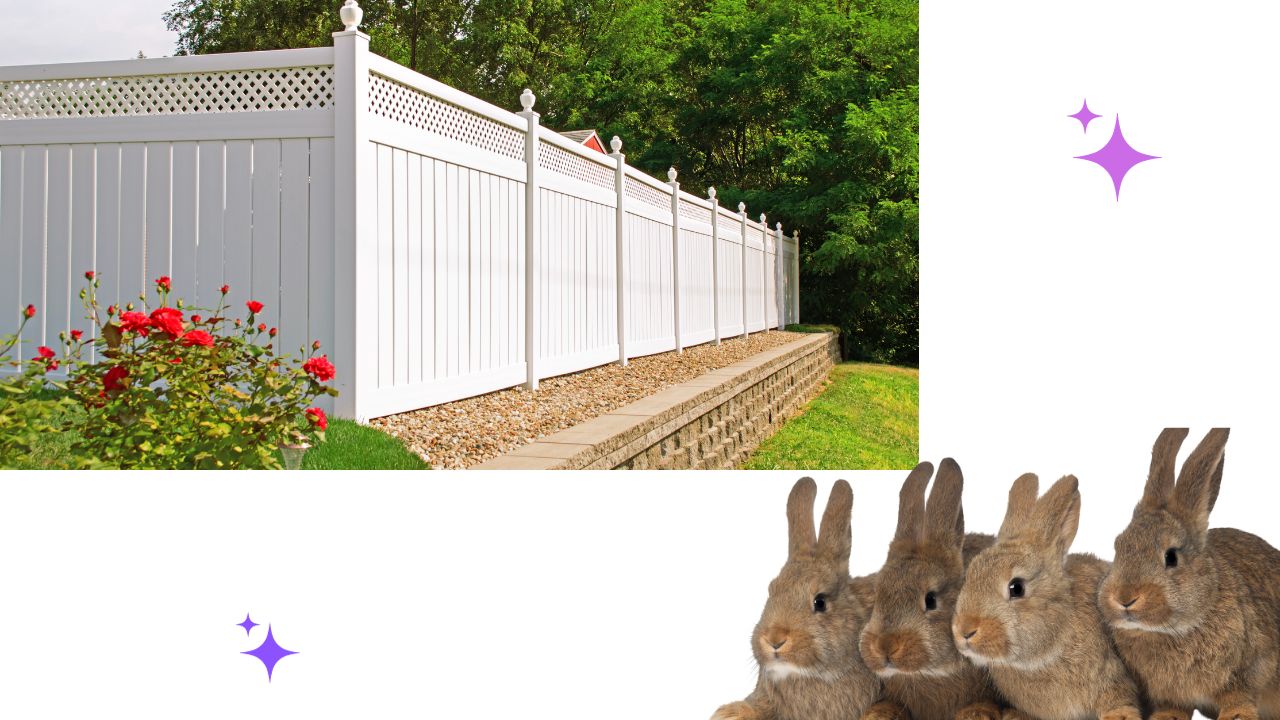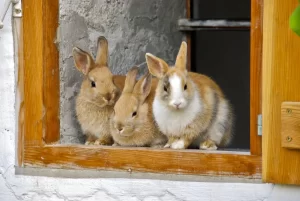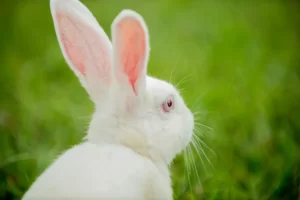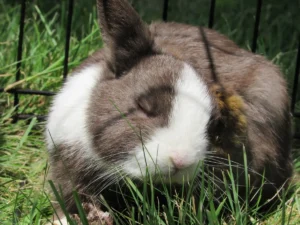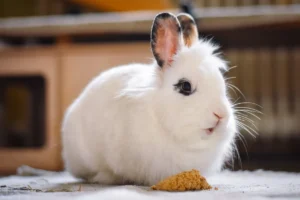Are you tired of rabbits wreaking havoc on your garden? Wondering if those pesky critters will chew through your plastic fence? Look no further!
In this informative article, we’ll delve into the behavior of rabbits towards plastic fences, uncover the factors that influence their chewing habits, and provide expert tips on choosing the right type of plastic fence to keep those furry intruders at bay.
Say goodbye to rabbit-induced garden woes with our comprehensive guide!
In This Article
- 1 Key Takeaways
- 2 The Behavior of Rabbits Towards Plastic Fences
- 3 Understanding the Strength and Durability of Plastic Fences
- 4 Factors That Influence Rabbit Chewing Behavior
- 5 Tips for Choosing the Right Type of Plastic Fence
- 6 Enhancing the Effectiveness of Plastic Fences Against Rabbits
- 7 Alternative Materials to Consider for Rabbit-Proof Fencing
- 8 Maintaining and Repairing Plastic Fences for Long-Term Rabbit Deterrence
- 9 Frequently Asked Questions
- 10 Conclusion
Key Takeaways
- Rabbit chewing habits are driven by their constantly growing teeth.
- Factors such as the material of the plastic fence and the presence of other rabbits can influence whether rabbits will chew through it.
- Environmental factors like boredom and lack of exercise can contribute to excessive chewing.
- Providing a variety of safe and appropriate chew toys, interactive toys, and tunnels can help alleviate boredom and prevent destructive chewing habits.
The Behavior of Rabbits Towards Plastic Fences
Do rabbits often chew through plastic fences towards other rabbits?
When it comes to rabbit chewing habits, their teeth are constantly growing, so they have a natural instinct to chew on things to keep them trimmed.
Plastic fences can be tempting for rabbits to chew on, but whether they chew through them towards other rabbits depends on several factors.
Firstly, the material of the plastic fence plays a role. Some rabbits may find certain types of plastic more appealing to chew on than others.
Additionally, the availability of other food sources and the presence of other rabbits may influence their behavior.
It’s important to note that chewing through a plastic fence can have negative consequences, such as escape or injury.
Therefore, it’s recommended to provide alternative, rabbit-friendly chewing options and to regularly inspect and reinforce the fence to prevent any potential damage.
Understanding the Strength and Durability of Plastic Fences
You can assess the strength and durability of plastic fences by testing their resistance to external factors like weather and impact. Plastic fence alternatives are gaining popularity due to their long term durability.
Here are some important points to consider when evaluating the strength and durability of plastic fences:
- Weather resistance: Plastic fences should be able to withstand extreme weather conditions such as rain, heat, and cold without deteriorating.
- Impact resistance: They should be able to withstand accidental impacts, such as being hit by a ball or a falling branch, without breaking or cracking.
- UV resistance: Plastic fences should be designed to resist the damaging effects of ultraviolet (UV) rays from the sun, which can cause fading and degradation over time.
- Maintenance requirements: Consider the level of maintenance required for plastic fences compared to other materials, such as wood or metal.
Factors That Influence Rabbit Chewing Behavior
When considering factors that influence rabbit chewing behavior, it’s important to understand the role of environmental stimuli and the availability of appropriate chew toys. Rabbits have a natural instinct to chew, which helps keep their teeth healthy and prevents them from becoming overgrown. Environmental factors such as boredom, lack of exercise, and a limited variety of chew toys can contribute to excessive chewing behavior in rabbits. Providing a stimulating and enriching environment for your rabbit can help reduce destructive chewing habits. This includes offering a variety of safe and appropriate chew toys, such as untreated wood blocks or apple branches. Additionally, ensuring that your rabbit has plenty of space to exercise and explore can help redirect their chewing behaviors. Understanding these environmental factors is crucial in maintaining a happy and healthy environment for your rabbit.
| Environmental Factors | Tips |
|---|---|
| Boredom | Provide interactive toys and tunnels |
| Lack of exercise | Allow daily supervised playtime outside of the cage |
| Limited chew toy variety | Offer a variety of safe and appropriate chew toys |
| Inadequate space | Provide a spacious and stimulating environment |
Tips for Choosing the Right Type of Plastic Fence
If you’re considering installing a plastic fence, make sure to research the different types available and choose one that best suits your specific needs and preferences. Plastic fences can be a great option for various reasons, such as their durability, low maintenance requirements, and affordability.
However, there are a few common mistakes to avoid when installing a plastic fence:
- Not properly preparing the ground before installation, which can lead to unevenness and potential damage to the fence.
- Choosing a fence with a low UV resistance, which can cause the plastic to fade or become brittle over time.
- Installing the fence without proper reinforcement or support, which can result in sagging or leaning.
- Not considering the local climate and weather conditions, which can impact the longevity and performance of the fence.
When comparing the cost effectiveness of different plastic fence options, consider factors such as the initial cost, maintenance requirements, and expected lifespan. It’s important to find a balance between affordability and quality to ensure that your plastic fence is a wise investment.
Enhancing the Effectiveness of Plastic Fences Against Rabbits
Consider reinforcing your plastic fence with chicken wire to provide an extra layer of protection against rabbits. While plastic fences can be effective in deterring rabbits, some determined rabbits may still attempt to chew through them. Enhancing rabbit proofing techniques can help ensure the safety of your garden or crops. One effective method is to combine a plastic fence with chicken wire, creating a double barrier that rabbits will find much more difficult to penetrate. Another option is to use natural deterrents for rabbits, such as planting rabbit-resistant plants or using repellents that contain ingredients like garlic or hot pepper. These natural deterrents can help discourage rabbits from approaching your fence in the first place. By implementing these strategies, you can significantly increase the effectiveness of your plastic fence in keeping rabbits out and protecting your plants.
| Enhancing Rabbit Proofing Techniques | Natural Deterrents for Rabbits |
|---|---|
| Reinforce plastic fence with chicken wire | Plant rabbit-resistant plants |
| Use natural deterrents like garlic or hot pepper | Apply repellents containing these ingredients |
| Create a double barrier for added protection |
Alternative Materials to Consider for Rabbit-Proof Fencing
Using metal mesh instead of traditional wire can be an effective alternative for rabbit-proof fencing. Metal mesh offers several advantages over other materials, making it a viable option for keeping rabbits out of your garden or property.
Here are some key benefits of using metal mesh:
- Durable and long-lasting: Metal mesh is more resistant to wear and tear compared to plastic fences, ensuring its longevity.
- Excellent visibility: Unlike solid plastic fences, metal mesh allows you to see through, providing better visibility of your surroundings.
- Greater security: Metal mesh offers better protection against determined rabbits, preventing them from squeezing through or chewing through the fence.
- Versatile: Metal mesh is available in various sizes and configurations, making it suitable for different types of applications, whether you need to protect a small garden or a larger area.
While plastic fences may be cheaper and easier to install, they’ve some limitations. Rabbits can chew through plastic fences, rendering them ineffective in the long run. Additionally, plastic fences may not be as durable as metal mesh, requiring frequent repairs or replacements.
Therefore, considering alternative materials like metal mesh can provide a more reliable and efficient solution for rabbit-proof fencing.
Maintaining and Repairing Plastic Fences for Long-Term Rabbit Deterrence
You should regularly inspect and reinforce your plastic fences to ensure long-term rabbit deterrence, as rabbits may attempt to chew and breach the fence. While plastic fences are known for their durability and longevity, they aren’t impervious to damage.
It’s important to be aware of common maintenance issues that can arise with plastic fences. One common issue is the degradation of the plastic material over time due to exposure to sunlight and harsh weather conditions. This can weaken the fence and make it more susceptible to rabbit chewing.
Additionally, plastic fences can become loose or develop small holes, providing an opportunity for rabbits to squeeze through.
Frequently Asked Questions
Can Rabbits Chew Through Metal Fences?
Rabbits can chew through chain link fences if they are determined. However, there are alternative fencing options to consider, such as using chicken wire or hardware cloth, which are more effective in keeping rabbits out.
What Are Some Common Signs of Rabbit Damage to Plastic Fences?
Rabbits can cause damage to plastic fences, leaving behind signs such as chew marks, holes, and scratches. To prevent this, reinforce the fence with wire mesh or use a metal fence instead.
Are There Any Specific Plastic Fence Brands That Are Known to Be More Rabbit-Proof?
To protect your plastic fence from rabbit damage, follow these best practices: reinforce the fence with wire mesh, bury it at least 6 inches deep, and trim nearby vegetation. Alternatively, consider using metal or chicken wire fences.
How Effective Are Electric Fences in Deterring Rabbits?
Electric fences can be highly effective in deterring rabbits. They provide a shock similar to getting zapped by static electricity, which can startle and discourage rabbits. However, be mindful of the impact on other small animals. Alternatively, consider using natural barriers or repellents.
Can Rabbits Dig Under Plastic Fences?
Rabbits can jump over plastic fences if they are not high enough. However, rabbits generally prefer digging under fences rather than chewing through them. It is important to consider both factors when choosing a fence to keep rabbits out.
Conclusion
In conclusion, rabbits are relentless creatures when it comes to chewing through plastic fences. Their determination knows no bounds, as they relentlessly gnaw through even the toughest of barriers.
It’s crucial to choose a high-quality, durable plastic fence and implement additional measures to enhance its effectiveness against these persistent nibblers.
Remember, the battle against rabbit invasion requires constant vigilance and proactive maintenance to ensure long-term rabbit deterrence.

